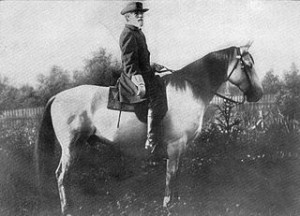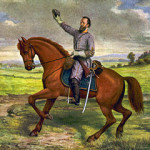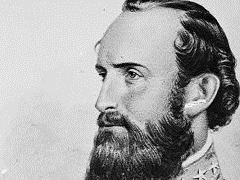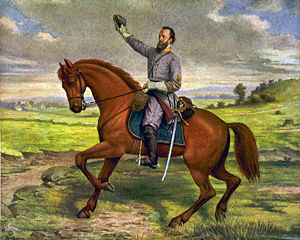Some Civil War Horses And Their Riders
Horses used by Robert E. Lee, William Tecumseh Sherman, Ulysses S. Grant, Stonewall Jackson, and George B. McClellan in the Civil War.
Traveller and Robert E. Lee
Confederate General Robert E. Lee came to Richmond, Virginia in the spring of 1861. During this visit Lee was given a bay stallion named Richmond. Richmond was a nervous horse and he proved to be unsatisfactory. When Richmond was near strange horses he would tend to squeal and this was not a good thing for a Civil War horse to do.Lee took Richmond to West Virginia and purchased another horse called The Roan or Brown-Roan. Unfortunately, The Roan began to go blind during the Seven Days’ Battle in June and July of 1862. The horse Richmond died after Malvern Hill. After Second Bull Run, cavalryman Jeb Stuart got Lee a mare named Lucy Long and also around this time, Lee received a sorrel horse named Ajax.
When Lee rode to Appomattox Court House to surrender to General Ulysses S. Grant on April 9, 1865 he was riding his favorite and most known horse. This gray colored horse was Traveller. After the Civil War when Robert E. Lee was president at Washington University (later renamed to Washington and Lee University), Lee’s favorite old war-horse Traveller was still with him. When Lee died, the horse Traveller walked behind Lee’s hearse in the funeral procession. Traveller walked with his head bowed and in a slow gait. Traveller is buried outside of the Lee Chapel on the campus of Washington and Lee University. Robert E. Lee is interred in a crypt beneath the Lee Chapel.
Lexington, Sam, and William Tecumseh Sherman
William Tecumseh Sherman had two favorite horses during the Civil War, these horses were named Lexington and Sam. Sherman rode Lexington at Atlanta and in the Grand Review in Washington at the close of the war. Sam was injured several times during the Civil War. At Shiloh, three of Sherman’s horses were killed during the battle. Two of these three horses died as an orderly held their reigns.
Cincinnati and Ulysses S. Grant
As a young man, Ulysses S. Grant developed a love of horses when he worked at his father’s farm. Grant became a skilled equestrian. Grant was an exceptional equestrian while a cadet at West Point, although he didn’t stand out as having exceptional talents in anything else at West Point. When Grant finished at West Point, he was hoping for a commission in the cavalry. At the time the cavalry had no vacancies, so Grant ended up in the infantry. For a horse-loving equestrian like Ulysses S. Grant, the infantry assignment must have been a great disappointment.
An admirer gave the horse Cincinnati to Grant after the Battle of Chattanooga and Cincinnati became Grant’s favorite horse during the Civil War. Cincinnati was seldom ridden by anyone other than Grant. One notable exception being President Abraham Lincoln, who rode Cincinnati when the president last visited City Point, Virginia. Other horses Grant had in the Civil War were Jack, Fox, and Kangaroo. Kangaroo was left on the Shiloh battlefield by the Confederates. This horse was described as ugly and raw-boned. Grant having an eye for horses however, knew that Kangaroo was a thoroughbred. After becoming a Yankee horse, Kangaroo got rest and care, and became a fine horse.
Little Sorrel and Stonewall Jackson
Little Sorrel was Confederate General Thomas Jonathan “Stonewall” Jackson’s horse. Stonewall was riding this horse when he was shot by friendly fire at Chancellorsville. Little Sorrel became Jackson’s horse in May of 1861 at Harpers Ferry. The horse was about eleven-years-old at this time. Note: There is reference to Stonewall’s horse being called both Old Sorrel and Little Sorrel.That Devil Dan and George B. McClellan
Union General George B. McClellan’s favorite war-horse was named Daniel Webster. Members of General McClellan’s staff began to call this horse “that devil Dan” because Daniel Webster was a speedy horse. The horses of McClellan’s staff members had trouble keeping up with “that devil Dan.” Daniel Webster was with McClellan at Antietam. This horse was described as being a dark bay, about seventeen hands high, a pure bred, handsome, and he seldom showed signs of fatigue. Daniel Webster was a fine example of a horse. When McClellan retired from military service, the horse Daniel Webster went with him. The horse nicknamed “that devil Dan” became the family horse of the McClellan family.
My Kingdom for a Horse: Confederate Leaders and their Horses
“A dog may be man’s best friend, but the horse wrote history.”
…Unknown




